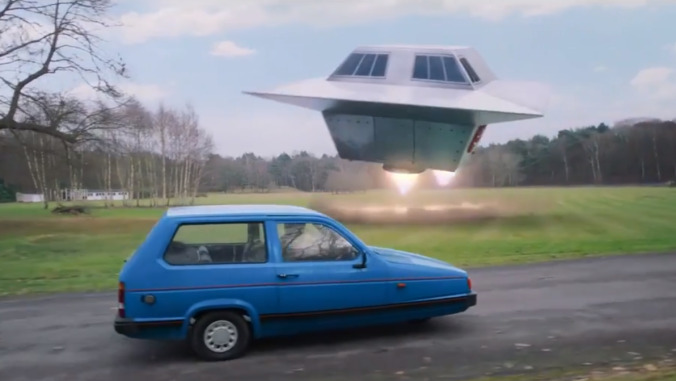Stories about the apocalypse are, pretty much by their nature, stories about being powerless. After all: Unless you’re Bruce Willis or Tony Stark, the end of the world is something that happens to you, rather than the other way around, and the deeper question that arises from it isn’t “How do I stop this?” but “What do I do in the face of a situation that’s clearly out of my control?”
If you’re the demon Crowley, the answer is simple: You run, you pray, and you get even—not necessarily in that order. If you’re the angel Aziraphale, you desperately search for someone, anyone, who has both the power and the willingness to make this awful thing right. If you’re the members of The Them, you watch in mute horror as the boy who’s always been your leader reveals himself to be your master—possibly everybody’s master—instead, dark and terrible in his urge to “fix” all the things that are wrong with this planet. And if you’re Anathema Device and Newton Pulsifer, well…
To put not too fine a point on it, you fuck.
“Saturday Morning Funtime” spends a lot of its time and energy moving these two particular pieces into, uh, place, tracking Newt’s eventful journey from London to Tadfield as Adam’s powers—inspired by an armful of Anathema’s New Age magazines—start to truly do a number on the world. This manifests in a sequence of extremely high-concept gags (Atlantis, Krakens, UFOs), the best of which is also the simplest: The transplantation of a couple of poor, perfectly normal Tibetan citizens into tunnels below a nondescript English village, because an 11-year-old boy who happens to be borderline omnipotent read that that’s where “Tibetan masters” are supposed to be. It’s goofy, but it’s deliriously goofy, with a quick-moving pace that makes this chapter feel like rising chaos, instead of the ticking checkbox that earlier installments have threatened to become.
As for our happily prophesied couple, let’s take them separately first. This is really the first time we’ve seen Newt in a context where he wasn’t either being a) yelled at by corporate assholes or b) badgered by Michael McKean, and he comes off as pleasantly normal. It’s a weird choice to take the character who’s ostensibly your audience surrogate—being neither an angel, demon, witch, child, Antichrist, apocalyptic horseman, or Shadwell—and make him spend so much time browbeaten, bewildered and concussed, but it’s nice to see Newt get to actually have some dialogue for once. Anathema, meanwhile, remains almost entirely defined by the prophecies; it’s hard to connect emotionally with a character who never really has to worry, because she knows what’s supposed to happen next. (Her quiet moment of hoping Newt won’t show up, thus proving that the world might not actually be ending, is a nice little touch of doubt, at least.) Still, Jack Whitehall and Adria Arjona have pretty good chemistry together as they trade their witch-hunting banter, and if their leap into bed (or, to be more precise, under-the-bed) together feels a little rushed, well, that’s destiny for you.
Other things in Tadfield are a lot less rosy, as Adam finally embraces his inner Omen, in sequences that seem to have shut up all those infernal tinkling harps and guitars that are always following these kids around for good. As Adam, Sam Taylor Buck has mostly been asked to deliver a series of malapropisms and unintentional jokes up until this point, but he manages to really sink his teeth into the most human part of the boy’s burgeoning ascension: The sense that the world was already ruined by idiots and adults by the time he got here, so why not wipe the slate clean? It’s a painful moment of 2019-era-despair making its way into this frequently dated-feeling show, and Buck sells the pissed-off “fuck everybody over 18" unfairness of it all. The other kids do similarly well with their rising fear of him, transforming this episode’s Them scenes into something that invitingly resembles outright horror. (Less terrifying: The visual of Adam levitating above his pals, which mostly just looks like he’s getting ready to put on a community theater rendition of Peter Pan.)
Speaking of failures of intimidation: I love Brian Cox as much as the next Rushmore and Deadwood fan, but his voice is way too warm—and distractingly human—for this show’s version of Death. Even so, the episode makes the most of the horseman sub-sub-plot for once, mostly by giving Simon Merrells more to play as the delivery man than just chipper indifference. Our real side-player MVP, though—beating out even Jon Hamm, who does a great bit of asshole jogging early on—is Ned Dennehey as Duke of Hell Hastur. This episode is surprisingly Hastur-heavy, and Dennehey is delightfully unpredictable throughout, swerving from stone-faced disdain to over-aggressive laughter to pathetic begging at the drop of a hat, with time for a stop at “stop-motion animal brutality” along the way.
Which brings us, in roundabout fashion, to where it inevitably must: Aziraphale and Crowley, both terminally in trouble with their higher (or lower) ups. There are only so many different ways to say “David Tennant and Michael Sheen are very good as these characters,” but let’s take a shot anyway: Tennant digs in, with exquisite gentleness, to Crowley’s carefully hidden heart as he’s looking for a new solar system to hide out in, begging God to just pick up the her-damned phone for once. And Sheen goes through about 40 different emotions while being confronted with a pack of intimidating fellow angels, eventually stumbling his way toward an ethical framework that leaves people, not angels and demons, to decide if they’re damned or not. Neither gets very far, of course, and both have their best moments when they briefly end up back in each other’s orbits: Crowley’s description of the universal order—“There’s just god, moving in mysterious ways, and not talking to any of us”—is heartbreaking in its frustration, but Aziraphale’s quiet “I forgive you” is even worse.
Thinking back over this episode—and the way it delighted me, when earlier entries left me quite a bit colder—all I can really settle on is the lovely, brisk, refreshing pace of the thing. “Saturday Morning Funtime” moves, and with a few minor exceptions, each place it moves to is a place worth visiting. (The detour with Hastur and the trio of avocado-joke-loving demons should feel like a total waste of time, for instance, but the performances make it work.) Armageddon is finally underway, and it’s a good look for this show—which, like Adam, finally seems to have found its purpose, leaving us powerless not to be swept along in its wake.
Stray observations
- There’s also the fact that the episode ends on the biggest laugh line of the entire series. (I assume; I still haven’t watched the last two, but this one would be hard to beat.) Even knowing it’s coming, Aziraphale’s “Oh, fuck” is a perfectly timed bit of profane genius.
- Michael McKean is great in that scene, too; it’s taken me a second to click with his Shadwell, but his willingness to just sort of push past other people’s logic and sense is a lovely thing to behold. (See also his description of Crowley: “I think he’s mah-fia!”)
- “Things on the internet can be made up. This is magazines!”
- Speaking of modern touches that feel weirdly anachronistic on this show: Anathema’s prophecy alert on her phone is a funny addition, and the show gets around the necessity of explaining Crowley’s answering machine by having God dub it “antique.”
- Of course Crowley invented selfies.
- One nice touch: Pollution very deliberately tossing the box his crown came in into the river.
- I frequently poke a little fun at the show’s CGI, but the stop-motion bit in the theater looked legitimately great. (The less said about the whole “traveling through the phone lines” part the better, though.)
- Amma Ris remains my favorite of the Them kids. Pepper’s read on “Oh my god, I want to be a whale!” was very fun.
- I gave him short shrift in the review proper, but Hamm remains absolutely perfect as Gabriel, the kind of terrible boss that probably collects World’s Best Boss mugs. His best moment might be resisting the urge to wink when denying that Heaven keeps a few discrete back channels open to Hell.
- The nastiest part of this entire episode happens in the pearly confines of those angelic offices: Michael, calling Ligur, and showing just how little a difference there really is between the “good guys” and the bad.
- Things seem pretty bleak right now; obviously, the only cure is to go back and re-watch the bit with Michael Sheen grinning like a beautiful moron while learning to dance the gavotte. (This really is a tremendously well-edited episode, isn’t it?)
- Ineffable count: Zero, but there was an undeniable sense of ineffability in the air.


 Keep scrolling for more great stories.
Keep scrolling for more great stories.
